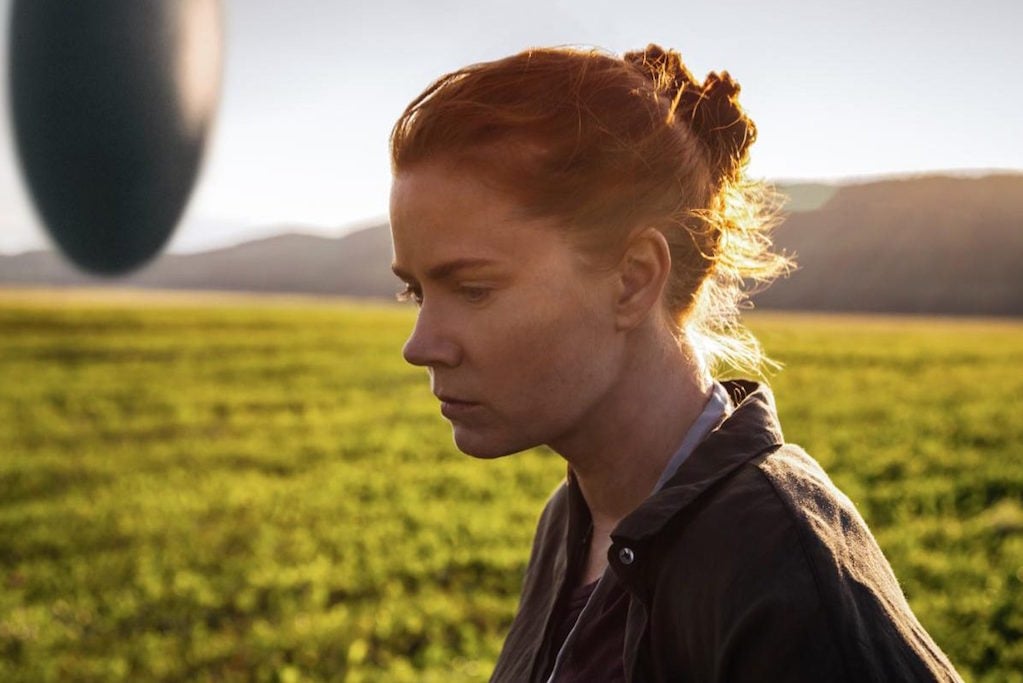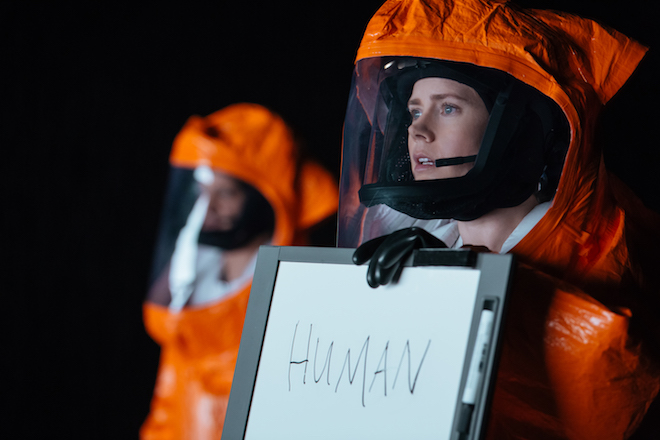‘Arrival’ Is The Kind Of Hopeful And Understated Sci-Fi We Need Right Now
It's being called an allegory to a Trump presidency.

Within the first ten minutes of Arrival, we witness “the day they arrived”. As linguistics professor Dr. Louise Banks (Amy Adams) walks into a college campus, she passes a scrum of bodies crowded around a TV. Inside her lecture hall, only a handful of students have turned up, their eyes fixed to phones and laptop screens. Just as Louise is about to launch into a lesson on how Portuguese relates to other Romance languages, she’s asked to switch the TV to a news channel.
We hear the stern breaking news report — 12 alien spacecrafts have appeared at various locations around the world, including one in Montana — while watching its effect on the faces of Louise and her students. Amy Adams is an expert at scenes like this, her expression somewhere between fear, wonder and resolve. The classroom’s trance is broken only by the wail of an alarm, a sure sign this isn’t an elaborate hoax.
Arrival opened in the US three days after the presidential election, an all-too-real world event that had people dumbstruck in front of TV screens and Twitter feeds. In Arrival, it’s a close encounter; in 2016 America, it was the moment Donald J. Trump took Florida.
Trump’s shock win has cast Arrival in an unexpected light. I first saw the movie on its opening night at a cinema in Manhattan, just blocks away from Union Square, where multiple anti-Trump protests gathered that week. There was a palpable unease on the streets of New York, and as a white Australian I can’t presume to know the alienation felt by the minority groups Trump has so freely targeted. It was a raw, uncanny time to sign up for two hours of science fiction escapism. But, to my surprise, Arrival felt less like a holiday from reality than an accidental counterpoint to the week’s news.
Politics and Prestige Sci-Fi
“Arrival will maybe be seen as a political film,” director Denis Villeneuve said at the Venice Film Festival in September, “but that was not my intention”. Film writer Mark Harris had a more prosaic forecast for Arrival, telling The Ringer it would likely fill the “once a year” slot previously held by Interstellar and The Martian. “[It’s] sort of genre, but in a high-end, serious director kind of way.”
Based on Arrival‘s cast, marketing, and awards season release date, that seemed like a dead-on prediction. Denis Villeneuve certainly fits the bill of serious director, although his previous outing, Sicario, was too busy in the dirt to look up at the stars. Sicario spun its drama from the particular cruelties of human beings, as seen through the lens of the war on drugs. It’s a dark, gripping and often portentous movie, painting the world as a broken “land of wolves”. A dive into Villeneuve’s earlier work, including Incendies and Prisoners, doesn’t exactly lighten that mood.

I think Hugh Jackman won Best Comedy Actor for this? Y/N?
With this pitch-black CV, you’d expect Villeneuve’s alien movie to be a paranoid affair. The fact that it’s not partly comes down to its origin story. While Sicario’s screenwriter Taylor Sheridan is happiest in murky moral waters, Arrival is based on a deep-thinking novella by science fiction writer Ted Chiang called Story Of Your Life. It was then extended to feature length by Hollywood gun for hire Eric Heisserer. The sensibility of the story has definitely had a tranquilising effect on Villeneuve.
The director is also surrounded by accomplished technicians, including cinematographer Bradford Young, whose beautifully controlled visual style elevated the likes of Ain’t Them Bodies Saints and A Most Violent Year. (Next up on his interstellar slate: the new Han Solo movie). Then there’s the score from Villeneuve’s regular collaborator Jóhann Jóhannsson, whose icy electronics and abstract vocal rhythms jolt us from awe to menace.
Who You Gonna Call? (A Linguist)
Arrival’s behind the scenes dream team makes a riveting first act. On the day of the arrival, we see Louise return to her lakeside house, which is elegant but cheerless. (She’s also fielding a fretful call from her mother, who has to be reminded not to watch the idiots on “that channel”.) There is a deep loss at the centre of Louise’s life, and the alien visitation grips her with a strange fascination.
Because she has past security clearance, Louise is called on by US Army Colonel Weber (Forest Whitaker) to decipher a clip of the aliens “speaking”. After she deems it impossible to work from an audio file, our hero is soon en route to the alien “shell” suspended above a field in Montana. She’s joined by Ian Donnelly (Jeremy Renner), who we know is a theoretical physicist and not a chiselled action man because of his glasses. Louise and Ian are tasked with asking the aliens one question: “What is your purpose on earth?” With no shared language, the mission is easier said than done.

I mean, they definitely don’t know what that means?
The other 11 shells are prompting a variety of responses from world leaders. Citizens are rioting in Venezuela, China and Russia are feeling trigger happy, and, alas, Australia’s scientists seem stumped. Meanwhile, at the army base in Montana, Agent Halpern (Michael Stuhlbarg) skulks around saying ominous CIA things. It soon becomes clear that solving this mystery will come down to two well-intentioned wonks from Team USA.
There’s not much further you can go beyond this setup before running into spoilers. However, the movie is full of potent images that cut through its black and blue tint: two fighter jets roaring over the college carpark, an approaching helicopter that glows through Louise’s window like a UFO, and the shell itself, whose grand reveal through the Montana clouds is heightened by Jóhannsson’s immersive score.
All of this technical brilliance distracts from some of the movie’s less wondrous elements. For a film so concerned with the intricacies of language, the dialogue is often leaden. Forest Whitaker, acting for no discernible reason with a bit-of-everything accent, is limited to delivering instructions and exasperation. We also get a clunky Jeremy Renner voiceover to propel the action on, and a muddled subplot of renegade army retaliation.
It’s a good thing, then, that Amy Adams does such agile acting with her face alone — even when it’s encased inside a plastic helmet. Arrival is entirely her movie, and the inevitable Academy Awards nomination (her sixth!) might just be the clincher.
Horror and Hopefulness
Despite its early rave reviews, I was left a little cold by that first viewing of Arrival. The gymnastics of the plot (warning: do not go in sleepy or half-drunk) clouded its emotional punch. I also happened to see Moonlight in the same week, and the aching, unadorned humanity of that movie hit me much harder.
With distance, though, I realised I’d brought my preconceptions of both science fiction and Villeneuve’s past prickliness to Arrival. If your preferred movie alien is the face-hugging, chest-bursting kind that plagues Sigourney Weaver, this will require a realignment of expectations. An easy comparison is the 1997 Jodie Foster vehicle Contact, but there are also echoes of Moon, the cult favourite directed by David Bowie’s son Duncan Jones. In its balance of the deeply personal and the great unknown, Arrival shares a thread of melancholy with both those films.
Without giving too much away, Arrival is an innately hopeful and pacifistic movie. Louise’s effort to understand the aliens, despite the fearful human reactions around her, makes a powerful case for communication over conflict.
The parallels with our own world — from alarmist cable news reports to an Alex Jones-type calling for an armed resistance — also feel prescient. Watching Arrival again a week after the election, I felt more forgiving of its flaws and admiring of its hopefulness. In the midst of an ugly year, there’s solace to be found in unexpected visitors.
–
Arrival is in cinemas now.
–
Jack Tregoning is a freelance writer based in New York. He tweets at @JackTregoning.